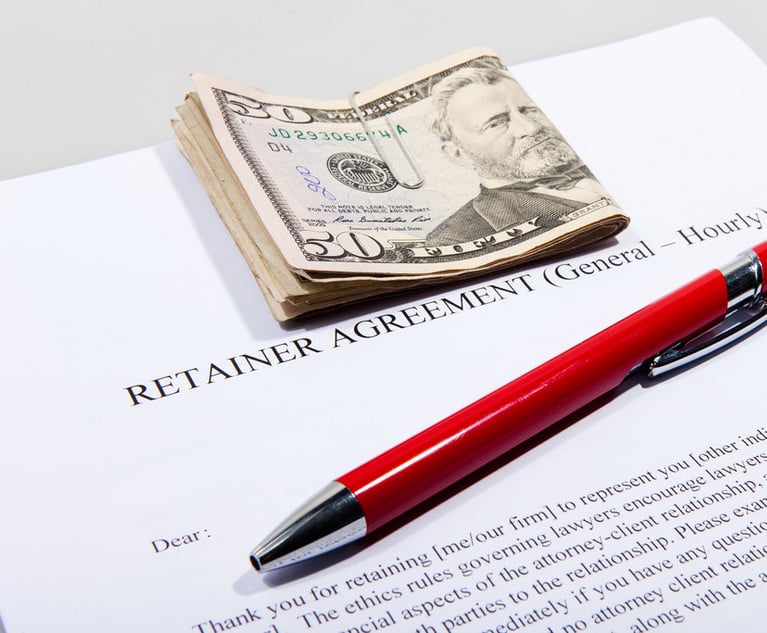 Andrea Curcio, professor of law, Georgia State University College of Law. (Courtesy photo)
Andrea Curcio, professor of law, Georgia State University College of Law. (Courtesy photo)As Bar Exam Goes Online, GSU Law Prof Offers More Ideas on Licensure
An imperfect exam, "is better than not having an exam at all," said GSU law professor Andrea Curcio.
July 23, 2020 at 03:28 PM
4 minute read
Back in March, when the phrase "social distancing" was still new, a group of law professors urged bar authorities around the country to start planning major changes for the next bar exam, scheduled for the last week of July.
The 11 professors, including Andrea Curcio of Georgia State University College of Law, said online bar exams would be risky because applicants could have trouble accessing safe spaces and solid Internet service, among other challenges.
Now that Georgia and many other states have decided to administer their bar exams online, Curcio spoke to the Daily Report to offer her thoughts.
Curcio said she appreciates the exam, which was set for more than 1,000 applicants in a conference center, being scheduled online. "It's going to save literally thousands of lives," she said.
Holding an exam so that recent law graduates can get their licenses to practice law will also, of course, help them—and an expected increase in clients needing legal advice to navigate evictions, bankruptcies and other economic fallout from virus suppression efforts.
An imperfect exam, she said, "is better than not having an exam at all." That situation that may be occurring in New York, where authorities canceled a September in-person exam without, so far, an online replacement.
Curcio still has some concerns about Georgia's online exam and thoughts about other avenues for recent law graduates to be licensed without needing to take an exam.
Curcio sounded confident that Georgia test-takers will be able to find safe, quiet places to take the exam that have sufficient Internet access, especially if law schools open their facilities to those who need them.
She is more concerned about how the exam will be graded and how a passing score will be determined, given that the National Council of Bar Examiners is not offering to help states analyze test data so that scores are compatible with how applicants were scored in previous years.
Curcio, who teaches civil procedure, evidence and civil pretrial litigation and also works on legal education and bar exam issues, suggested that bar applicants get a little more time, such as 30 minutes, for the essay questions, given the new format of online case materials that might require a lot of scrolling.
She also suggested allowing open book testing, as Nevada is doing. Doing so would relieve many security issues, she says, and may serve as a "security blanket" to applicants who have had to prepare for the test in such unusual circumstances.
"This year's examinees are incredibly stressed," she said. Many planned on studying for 10 weeks for the bar exam, not for a process that would last till October. Many graduates had student loans that were timed to run out this summer, when they were expecting to start legal jobs that have been postponed till next year.
Curcio also suggested two other paths to bar licensure that would not require a bar exam, relieving pressure on applicants.
A "supervised practice" would allow an applicant to works for an experienced bar member for a specific period of time, such as 320 hours. The applicant be able to join the bar if the supervising lawyer certified the work the applicant did and expressed confidence that the applicant could serve clients appropriately.
Curcio imagined this process working well with big firms, prosecuting, public defender and legal aid offices .
"Clinical licensure," she said, could be granted to applicants, if their professors certified their work in law school supervised clinics allowed sufficient experience to be able to practice law. Curcio said law schools could compile that information within a month.
A spokeswoman for the state Supreme Court said the Office of Bar Admissions' announcement Monday of specific details about the online exam will address many of Curcio's ideas.
This content has been archived. It is available through our partners, LexisNexis® and Bloomberg Law.
To view this content, please continue to their sites.
Not a Lexis Subscriber?
Subscribe Now
Not a Bloomberg Law Subscriber?
Subscribe Now
NOT FOR REPRINT
© 2025 ALM Global, LLC, All Rights Reserved. Request academic re-use from www.copyright.com. All other uses, submit a request to [email protected]. For more information visit Asset & Logo Licensing.
You Might Like
View All
40% Contingency: A New Ruling Just Cost This Plaintiff Team $827K in Legal Fees
6 minute read
'David and Goliath' Dispute Between Software Developers Ends in $24M Settlement

Trending Stories
- 1Can Passive Technology Change the Impaired Driving Trajectory?
- 2Bradley Arant, Moore & Van Allen Join Partner Promotions Parade
- 37th Circ. Rejects Liability Claims Against Freight Broker's Hiring Choices
- 4Sullivan & Cromwell Signals 5-Day RTO Expectation as Law Firms Remain Split on Optimal Attendance
- 5CLOSED: These Georgia Courts Won't Open Jan. 10
Who Got The Work
Michael G. Bongiorno, Andrew Scott Dulberg and Elizabeth E. Driscoll from Wilmer Cutler Pickering Hale and Dorr have stepped in to represent Symbotic Inc., an A.I.-enabled technology platform that focuses on increasing supply chain efficiency, and other defendants in a pending shareholder derivative lawsuit. The case, filed Oct. 2 in Massachusetts District Court by the Brown Law Firm on behalf of Stephen Austen, accuses certain officers and directors of misleading investors in regard to Symbotic's potential for margin growth by failing to disclose that the company was not equipped to timely deploy its systems or manage expenses through project delays. The case, assigned to U.S. District Judge Nathaniel M. Gorton, is 1:24-cv-12522, Austen v. Cohen et al.
Who Got The Work
Edmund Polubinski and Marie Killmond of Davis Polk & Wardwell have entered appearances for data platform software development company MongoDB and other defendants in a pending shareholder derivative lawsuit. The action, filed Oct. 7 in New York Southern District Court by the Brown Law Firm, accuses the company's directors and/or officers of falsely expressing confidence in the company’s restructuring of its sales incentive plan and downplaying the severity of decreases in its upfront commitments. The case is 1:24-cv-07594, Roy v. Ittycheria et al.
Who Got The Work
Amy O. Bruchs and Kurt F. Ellison of Michael Best & Friedrich have entered appearances for Epic Systems Corp. in a pending employment discrimination lawsuit. The suit was filed Sept. 7 in Wisconsin Western District Court by Levine Eisberner LLC and Siri & Glimstad on behalf of a project manager who claims that he was wrongfully terminated after applying for a religious exemption to the defendant's COVID-19 vaccine mandate. The case, assigned to U.S. Magistrate Judge Anita Marie Boor, is 3:24-cv-00630, Secker, Nathan v. Epic Systems Corporation.
Who Got The Work
David X. Sullivan, Thomas J. Finn and Gregory A. Hall from McCarter & English have entered appearances for Sunrun Installation Services in a pending civil rights lawsuit. The complaint was filed Sept. 4 in Connecticut District Court by attorney Robert M. Berke on behalf of former employee George Edward Steins, who was arrested and charged with employing an unregistered home improvement salesperson. The complaint alleges that had Sunrun informed the Connecticut Department of Consumer Protection that the plaintiff's employment had ended in 2017 and that he no longer held Sunrun's home improvement contractor license, he would not have been hit with charges, which were dismissed in May 2024. The case, assigned to U.S. District Judge Jeffrey A. Meyer, is 3:24-cv-01423, Steins v. Sunrun, Inc. et al.
Who Got The Work
Greenberg Traurig shareholder Joshua L. Raskin has entered an appearance for boohoo.com UK Ltd. in a pending patent infringement lawsuit. The suit, filed Sept. 3 in Texas Eastern District Court by Rozier Hardt McDonough on behalf of Alto Dynamics, asserts five patents related to an online shopping platform. The case, assigned to U.S. District Judge Rodney Gilstrap, is 2:24-cv-00719, Alto Dynamics, LLC v. boohoo.com UK Limited.
Featured Firms
Law Offices of Gary Martin Hays & Associates, P.C.
(470) 294-1674
Law Offices of Mark E. Salomone
(857) 444-6468
Smith & Hassler
(713) 739-1250







